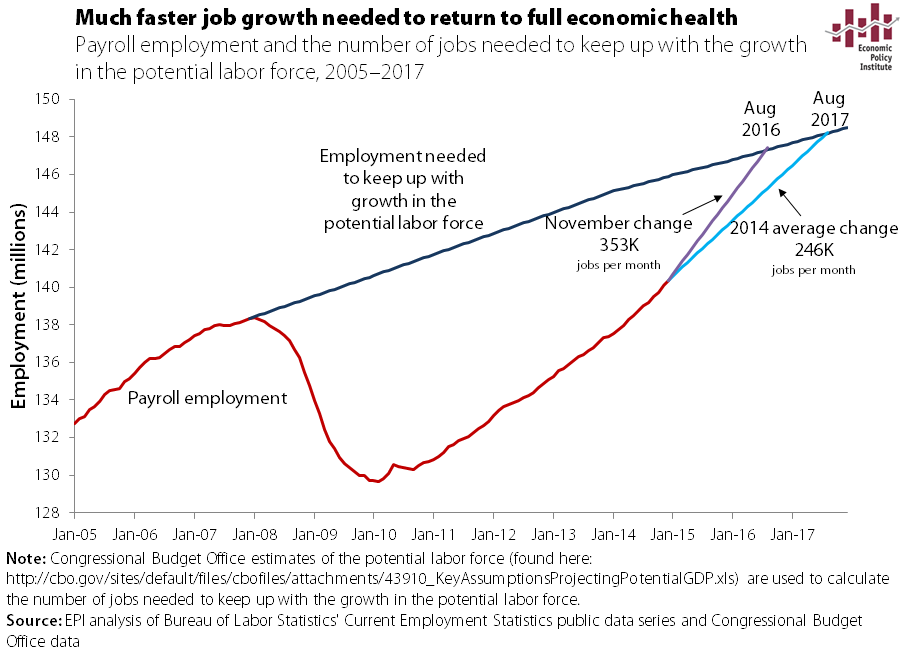The Bureau of Labor Statistics made official on Friday what many had already come to believe: that when it comes to job creation, 2014 was the best year the U.S. economy has seen in more than a decade. The announcement that employment rose by 252,000 in December means that average monthly job growth for the year was 246,000 per month.
Unemployment also dropped to 5.6 percent of the labor force, which is at the top end of the range some economists consider to be the natural rate. Wages actually fell slightly in December, and the annual growth of wages for 2014 was an anemic 1.7 percent, down from an also unimpressive 1.9 percent in 2013.
Related: Elizabeth Warren Trumps Obama’s Economic Message
In a note, PNC Financial Services Group Chief Economist Stuart Hoffman said he was confident the wage growth would pick up in the New Year. “Faster wage growth remains the missing piece of the puzzle, but with the unemployment rate declining further and 21 states raising their minimum wage starting this month, wages should accelerate as 2015 progresses,” he wrote.
Hoffman noted that while December average hourly earnings ticked down, overall earned income was up slightly. “The average workweek held steady at 34.6 hours in December. Combining more workers, lower average hourly wages and a steady average workweek (total hours worked rose by 0.2 percent), workers' earned income rose by a moderate 0.1 percent in December.”
But just in case anybody felt like celebrating too much, Elise Gould, senior economist at the Economic Policy Institute had a bucket of cold water all ready.
Related: How Low Will Oil Prices Go?
“In December, the economy added 252,000 jobs; average monthly job growth in 2014 was 246,000 jobs,” she wrote. “This is a clear improvement over the last several years, but the reality is that if we add 246,000 jobs a month going forward, it will take until August 2017 to hit the employment level needed to return the economy to the labor market health that prevailed in 2007.”
In fact, for all the good news in the report, and all the evidence that 2014 was the best year for the U.S. economy since the financial crisis ushered in the Great Recession, observers across the political spectrum pointed out that the news was really only good when compared to what the U.S. has been used to since 2008.
“We’re doing much better than we were, we’re doing much better than the rest of the world, but we’re not doing well enough,” said former Treasury Secretary Lawrence Summers, who more recently served as President Obama’s first Director of the National Economic Council. “We haven’t had a year of three percent growth in a very long time in the United States and if you look at what the bond market is saying with rates coming down as much as they have, it suggests continuing concern about underlying growth in this economy. So we’ve got to be focused on equitable growth for the years ahead.”
Related: Obama’s Housing Programs Still More Hype than Help
Summers, who appeared on CNBC shot long before the official numbers were released, said, “We need to get the economy growing more rapidly and making sure that everybody shares in that prosperity. Yes, we can take satisfaction from what’s happened, but if you look at forecasts for the medium term for the U.S. economy they’re now below two percent.”
The message was the same from Republicans on Capitol Hill. “The American people are concerned about this economy, and their elected representatives should be too,” said Rep. Paul Ryan (R-WI), the new chairman of the House Ways and Means Committee. “Too many families are living paycheck to paycheck. And those paychecks are shrinking. In other words, families are working harder and harder to get ahead, and yet too many are falling further behind. "We can't be satisfied until our country is meeting its full potential.”
Top Reads from The Fiscal Times




